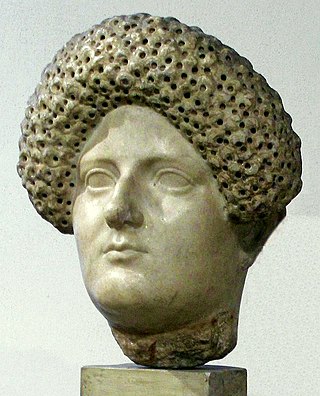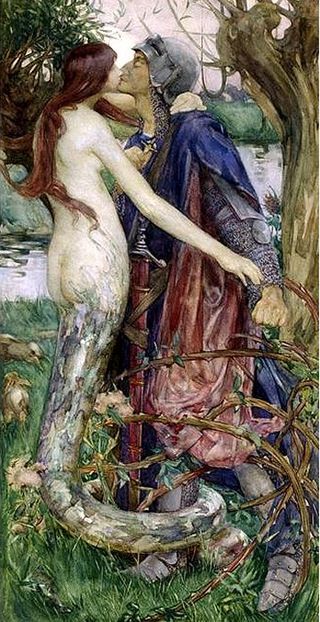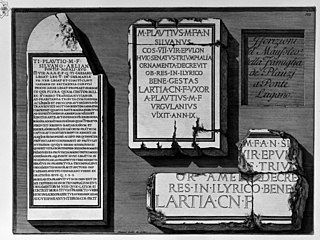Lamia is a daemon in Greek mythology.
Contents
Lamia may also refer to:
Lamia is a daemon in Greek mythology.
Lamia may also refer to:

Around the start of the Common Era, the family trees of the gens Julia and the gens Claudia became intertwined into the Julio-Claudian family tree as a result of marriages and adoptions.
Mormo was a female spirit in Greek folklore, whose name was invoked by mothers and nurses to frighten children to keep them from misbehaving.

Domitia Longina was a Roman empress and wife to the Roman emperor Domitian. She was the youngest daughter of the general and consul Gnaeus Domitius Corbulo. Domitia divorced her first husband, Lucius Aelius Lamia Plautius Aelianus in order to marry Domitian in AD 71. The marriage produced only one son, whose early death is believed to have been the cause of a temporary rift between Domitia and her husband in 83. She became the empress upon Domitian's accession in 81, and remained so until his assassination in 96. She is believed to have died sometime between AD 126 and 130.

Lamia, in ancient Greek mythology, was a child-eating monster and, in later tradition, was regarded as a type of night-haunting spirit (daemon).

The gens Aurelia was a plebeian family at ancient Rome, which flourished from the third century BC to the latest period of the Empire. The first of the Aurelian gens to obtain the consulship was Gaius Aurelius Cotta in 252 BC. From then to the end of the Republic, the Aurelii supplied many distinguished statesmen, before entering a period of relative obscurity under the early emperors. In the latter part of the first century, a family of the Aurelii rose to prominence, obtaining patrician status, and eventually the throne itself. A series of emperors belonged to this family, through birth or adoption, including Marcus Aurelius and the members of the Severan dynasty.
Lucius Aelius Lamia was a Roman Senator who held a number of offices under Augustus and Tiberius. He was consul in the year AD 3 with Marcus Servilius as his colleague.
The gens Aelia, occasionally written Ailia, was a plebeian family in Rome, which flourished from the fifth century BC until at least the third century AD, a period of nearly eight hundred years. The archaic spelling Ailia is found on coins, but must not be confused with Allia, which is a distinct gens. The first member of the family to obtain the consulship was Publius Aelius Paetus in 337 BC.

Tiberius Plautius Silvanus Aelianus was a Roman patrician who twice served as consul, in 45 and 74 AD. He was the adopted nephew of Plautia Urgulanilla, first wife of the emperor Claudius. It is known he offered up the prayer as pontifex when the first stone of the new Capitol was laid in 70 AD. In some ancient sources he is referred to as Plautius Aelianus, but we learn from an inscription that his full name was Tiberius Plautius Silvanus Aelianus, and that he held many important military commands.
Lucius Plautius Lamia Silvanus was a Roman senator.
Lucius Aelius Lamia Plautius Aelianus was a Roman senator.
The gens Apronia was a plebeian family at ancient Rome throughout the history of the Republic and into imperial times. The first member of the gens to achieve prominence was Gaius Apronius, tribune of the plebs in 449 BC. None of the Apronii obtained the consulship until the first century AD.
The gens Domitia was a plebeian family at ancient Rome. The first of the gens to achieve prominence was Gnaeus Domitius Calvinus, consul in 332 BC. His son, Gnaeus Domitius Calvinus Maximus, was consul in 283, and the first plebeian censor. The family produced several distinguished generals, and towards the end of the Republic, the Domitii were looked upon as one of the most illustrious gentes.
Lucius Fundanius Lamia Aelianus was a Roman senator active in the reigns of Trajan and Hadrian.

The gens Fundania was a plebeian family at Ancient Rome, which first appears in history in the second half of the third century BC. Although members of this gens occur well into imperial times, and Gaius Fundanius Fundulus obtained the consulship in BC 243, the Fundanii were never amongst the more important families of the Roman state.
The gens Gellia was a plebeian family at ancient Rome, where they settled after the Second Punic War. The first of the Gellii to obtain the consulship was Lucius Gellius Poplicola, in 72 BC, but the most famous member of this gens is probably the grammarian Aulus Gellius, who flourished during the second century AD.

The gens Plautia, sometimes written Plotia, was a plebeian family at ancient Rome. Members of this gens first appear in history in the middle of the fourth century BC, when Gaius Plautius Proculus obtained the consulship soon after that magistracy was opened to the plebeian order by the Licinio-Sextian rogations. Little is heard of the Plautii from the period of the Samnite Wars down to the late second century BC, but from then to imperial times they regularly held the consulship and other offices of importance. In the first century AD, the emperor Claudius, whose first wife was a member of this family, granted patrician status to one branch of the Plautii.
Quintus Aurelius Pactumeius Fronto was a Roman senator active during the first century AD. He was suffect consul for the nundinium September-October 80 as the colleague of Lucius Aelius Lamia Plautius Aelianus.
Plautia was a Roman woman of senatorial rank whom Classical scholars believe lived in the late first century and early second century AD. No direct evidence of her existence has yet been found. Ronald Syme comments about her situation, "Plautia exemplifies a common phenomenon in the history of Imperial Rome; a fragment of knowledge rescued from the waters of oblivion, but a figure of consequence in the social and political history of the time."
Marcus Plautius Silvanus was a Roman senator, and was praetor elect in AD 24. He held the duumvirate of Trebula Suffenas in AD 23.
Quintus Aelius Tubero was a Roman jurist and historian.